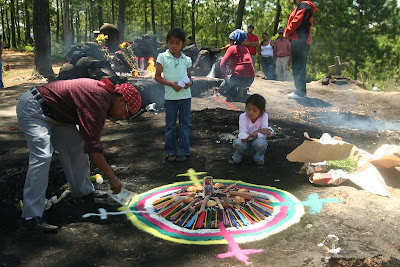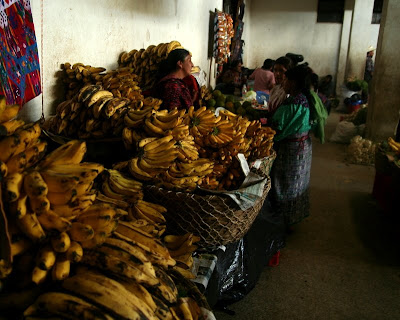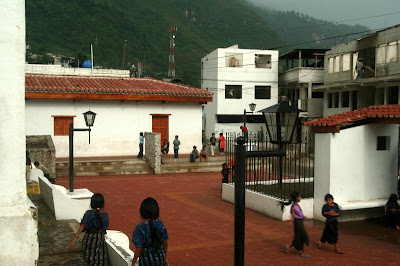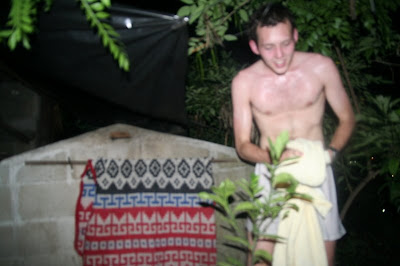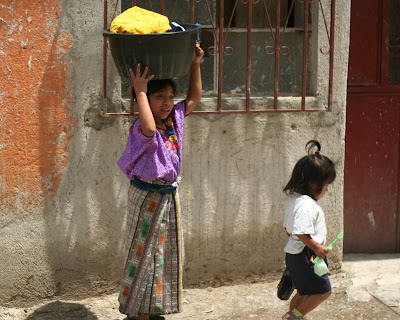 For some reason our tap water has stopped, so Catarina has been washing clothes at the lake, a not-uncommon thing here.
For some reason our tap water has stopped, so Catarina has been washing clothes at the lake, a not-uncommon thing here.Yesterday I was sitting in the back of Luis's tienda chowing down on some hot tortillas and ham with Catarina and Wilson when they pointed at two packages, one full of canned refried beans and another full of packs of incaparina and mosh, both different kinds of cornmeal/grain meal. They said they got them from the proyecto, this building in town I have seen with its CFCA logo and a cross. I had walked by here earlier and they were yelling names out of a loudspeaker, I guess for the food pickup. The food apparently comes from a partnership they have with a church in the United States. Funny, because growing up at Briarwood Christian School, there were often drives to send food to “third world countries.” Cool to be on the other side of the food donation box for once.
The beans are packed with fat, iron, protein, and especially fiber (53% DV!). We had them last night for dinner and this morning for breakfast, this morning accompanied by a surprise: home-made french fries that were really tasty. I hope it's not going to be beans all the time now.
Incaparina, by the way, is this vitamin-fortified meal (cornmeal?) stuff made by Quaker. Catarina mixes it with cinnamon and sugar to make a hot, thick drink called atol. It tastes remarkably like french toast, quite good. And then there's mosh, also made by Quaker, which is basically oatmeal. They make this with milk and serve it in mugs.
Two days ago, some classmates and I decided to climb Cerro de Oro, the baby volcano around here. It took us about 30 to 40 minutes to get to the top. It was remarkably humid. About a quarter of the way up at a pretty steep part, we moved to the side for a man and a boy to bring down packs of firewood slung over their backs. We also passed some farmland at a milder part. It's hard to imagine this being part of a daily routine. Afterwards some of us went swimming.
Some of us (last I heard: I, Derek, Zach, and Allie) got the crazy idea to climb Volcan Atitlan, the tallest one around the lake; you have seen it in the photos. In order to do this I will spend Sunday night at Zach's place in San Lucas order to begin our climb at 4 a.m. We're going with a guide. I don't know if I should take my camera or not. The volcanoes around here are notorious for being popular with the tourist-robbers (what a brilliant idea, you know? Who's going to catch you coming down a volcano?). In San Pedro, it's now customary (and may even be a law) to have a police escort up and down the volcano. Tune in next week to see what Daniel decides!
I want to talk a bit about depictions of Jesus around here, which I think would have made an interesting paper topic. A few nights ago, Luis Miguel came into my room to show me two framed images of Jesus. I will defer you to the photos for details, but they are both holographic, like Pokemon cards. He pointed out the different components, such as the saints and such in the corners. One time Wilson proudly showed me a plate of stickers that he bought in Pana with all kinds of holy imagery: Mary in a halo, Jesus on a cross in bright colors, stars and mangers and crosses and praying hands and twinkly holographic colors. I have seen them on school supplies and such. Little light painting/print things of Jesus on the cross are hung about the home: one over our dining table, two in my room (one of someone praying to Mary).
My host family doesn't go to church. There are many Evangelical churches and a large Catholic churc in town, all very popular. I mentioned the pictures on my host-mom's desk: two of Jesus on either side of Maximon (see 31 de Mayo entry). I ask about the images, and Luis Miguel will say, “Es hey-soos!” We don't pray before we eat or anything. Luis doesn't like the church's annual festival; he much prefers the town festival on the 26th of November, in honor of Santa Catarina. He seemed a little surprised when I told him that we in the United States have no patron saints for our towns.
But it's not just my family. A huge majority of the transit vehicles you'll see here (pickups, chicken buses, tuk-tuks) are Jesussed-out. A popular decal on the back window of tuk-tuks is “JESUCRISTE VIVE” in cool letters, difficult to read at first. “Dios me Guia” (God guides me) and “Dios es Amor” (guess) are popular banners across the windshields of pickups. I have seen a tuk-tuk with twin decals of Jesus' pained face in a crown of thorns slapped across its mudflaps. The internet place where I am right now sells random household items: mugs, glasses, picture frames, and a clock with Jesus on it and a clock with Mary on it.
I don't have any particular opinion to share about this, but it intrigues me: Jesus and some saints have taken the status of something like a pop-mythology. The plates of stickers remind me of Disney movies, the car decals of sports teams, the little charms I see of happy-meal toys, but unlike all these other things, Jesus is not owned by a company.
My relationships with Catarina and Wilson continue to grow, not so much with Luis and Luis Miguel. I am learning more Kaqchikel, and today I am going to begin trying out Kaqchikel greetings to the locals that I pass by. I wonder how they will take it, especially the old folks (I want to say “elders”). Some of them seem too austere to take it lightly, which is what I feel like I'm doing. Oh well. My host family encourages it.
At the end of every meal, when you finish your plate, you say “Matiosh,
My project is going along okay. Interviews are getting easier because I have made a questionnaire to give out, instead of having to just approach people and say ´´Let´s talk about dogs.´´
Right now I´m sitting in an internet place listening to the kids who live here playing house. What´s interesting is that they talk in Spanish when they are role-playing, but in Kaqchikel when it´s like okay, you be the policeman and other technical stuff.
That´s about all I have for now.
 the Jesus images
the Jesus images  Luis Miguel´s new marbles
Luis Miguel´s new marbles a ´maraton´ celebrating a school´s anniversary, blocking traffic
a ´maraton´ celebrating a school´s anniversary, blocking traffic climbing Cerro de Oro
climbing Cerro de Oro



 There´s just no getting around it: if you want good lighting, you have to wake up early. I accompanied Catarina to go clothes-washing yesterday at 6 am and bathed in the hot springs, which was nice. The next 2 photos and the one up top were taken between 6:30 and 7:30 that day.
There´s just no getting around it: if you want good lighting, you have to wake up early. I accompanied Catarina to go clothes-washing yesterday at 6 am and bathed in the hot springs, which was nice. The next 2 photos and the one up top were taken between 6:30 and 7:30 that day.

 a street vendor in Santa Catarina
a street vendor in Santa Catarina Luis Miguel drying the clothes on the roof.
Luis Miguel drying the clothes on the roof.




